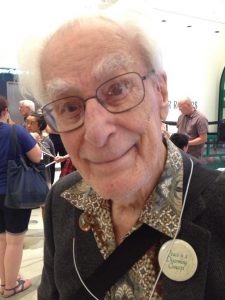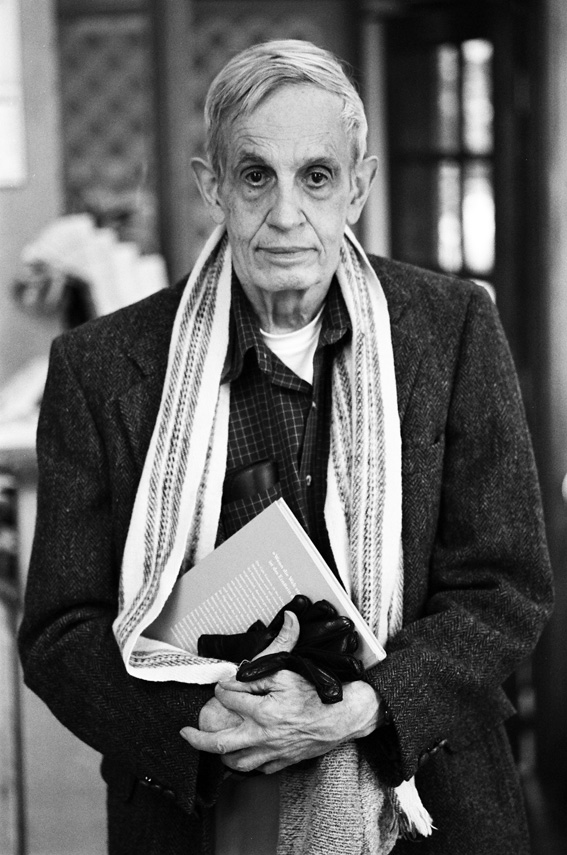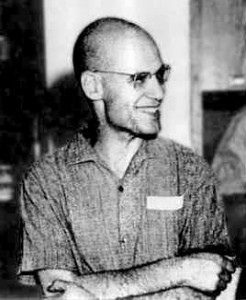
Mathematician John Horton Conway, a professor at both the University of Cambridge and Princeton University, and the originator of hundreds of lovely and clever maths things, has died at the age of 82.

Mathematician John Horton Conway, a professor at both the University of Cambridge and Princeton University, and the originator of hundreds of lovely and clever maths things, has died at the age of 82.

We’re greatly saddened to hear of the death of Richard K. Guy yesterday morning. He was 103.
Richard K. Guy was a prolific collaborator. He co-authored four papers with Paul Erdős, worked frequently with John H. Conway and Elwyn Berlekamp, and was a frequent contributor to Martin Gardner’s Mathematical Games column.
The most well-known of Guy’s discoveries is the glider in Conway’s Game of Life.
He described himself as an amateur mathematician, often tackling problems that are best described as ‘recreational mathematics’. His work was not restricted to one area of maths, but often involved a combinatoric aspect.
Recreational mathematics occupied Guy’s mind for much longer than a normal lifetime, so you’ll have to take your pick from his bibliography. Fortunately, many of the problems and ideas that Guy wrote about can be tackled independently. The Nesting and Roosting Habits of the Laddered Parenthesis and The Number-Pad Game are two typical examples.
Two of the most approachable of Guy’s books are Winning Ways for Your Mathematical Plays, written with John H. Conway and Elwyn Berlekamp, and The Book of Numbers, written with John H. Conway.
We wrote a post on Guy’s 100th birthday, and the University of Calgary set up a page celebrating his life. Colm Mulcahy also wrote a long post summing up Guy’s first 100 years in his MAA blog.
Guy’s final book, The Unity of Combinatorics, co-authored with Ezra Brown, is due out in May from MAA Press.
In a double-whammy of sad news, we’ve learned of the passing of two mathematical figures, famous for very different reasons – fields medalist Vladimir Voevodsky, and gameshow creator and host Monty Hall.
“I’m proud that I’ve lived to see… so many of the things that I’ve worked on being so widely adopted that no one even thinks about where they came from.” ((Solomon W. Golomb – 2016 Laureate of the Franklin Institute in Electrical Engineering)) Solomon Golomb (1932-2016)
Solomon Golomb, who died on Sunday May 1st, was a man who revelled in the key objects in a recreational mathematician’s toolbox: number sequences, shapes and words (in many languages). He also carved out a distinguished career by, broadly speaking, transferring his detailed knowledge of the mathematics behind integer sequences to engineering problems in the nascent field of digital communications, and his discoveries are very much still in use today.

John Nash, famous for his work in game theory and as the subject of the film A Beautiful Mind, has died in a car crash, according to the BBC.
As well as winning the (in memory of but not actually a) Nobel Prize for Economics in 1994, Nash was recently awarded the Abel Prize for his work on nonlinear partial differential equations.
‘Beautiful Mind’ mathematician John Nash killed on the BBC.
Famed ‘A Beautiful Mind’ mathematician John Nash, wife killed in taxi crash, police say at nj.com.
John Nash’s unique approach produced huge leaps in economics and maths by Alex Bellos in the Guardian.
Alex Bellos’s short essay about the work which earned Nash and Nirenberg the 105 Abel Prize.
Equilibrium points in N-person games, the 1950 paper in which Nash introduced the concept of the Nash equilibrium.
The bargaining problem, Nash’s 1950 paper which introduced his solution to the classic economics problem.
The Nash-Kuiper embedding theorem was used recently to construct an amazing isometric embedding of the flat torus in Euclidean space.
Nash’s letter to the NSA (PDF) in which he described an encryption-decryption machine, anticipating more recent ideas of computational complexity.
An obituary has been published in The Guardian for Ivor Grattan-Guinness, historian of mathematics and logic, who died of heart failure on 12th December 2014. This begins by explaining that when Ivor became interested in the history of mathematics in the 1960s,
it was an area of study widely considered to be irrelevant to mathematics proper, or something that older mathematicians did on retirement. As an undergraduate at Oxford, he found that mathematics was presented drily, with no inkling of the original motivations behind its development. So Ivor set himself the task of asking “What happened in the past?” — as opposed, he said, to taking the heritage viewpoint of asking “How did we get here?”
Read more: Ivor Grattan-Guinness obituary (The Guardian).

Copyright: MFO
Here’s a small collection of links to articles about Alexandre Grothendieck, French/German mathematician and algebraic geometer, who died on Wednesday 13 November aged 86. He was a pioneer in the field, and has been described as ‘the greatest mathematician of the 20th century’.